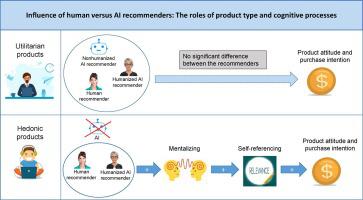Journal of Business Research ( IF 11.3 ) Pub Date : 2021-08-16 , DOI: 10.1016/j.jbusres.2021.08.016 Anders Hauge Wien 1 , Alessandro M. Peluso 2

|
Previous research suggests that consumers would listen more to product recommendations from other consumers (human recommenders) than from systems based on artificial intelligence (AI recommenders). We hypothesize that this might depend on the type of product being recommended, and propose an underlying process driving this effect. Three experiments show that, for hedonic products (but not for utilitarian products), human recommenders are more effective than AI recommenders in influencing consumer reactions toward the recommended product. This effect occurs because, when compared to AI recommenders, human recommenders elicit stronger mentalizing responses in consumers. This, in turn, helps consumers self-reference the product to their own needs. However, humanizing AI recommenders increases mentalizing and self-referencing responses, thus increasing the effectiveness of this type of recommenders for hedonic products. Together, these findings provide insight into when and why consumers might rely more on product recommendations from humans as compared to AI recommenders.
中文翻译:

人类推荐与人工智能推荐的影响:产品类型和认知过程的作用
先前的研究表明,与基于人工智能的系统(AI 推荐者)相比,消费者会更多地听取其他消费者(人类推荐者)的产品推荐。我们假设这可能取决于推荐的产品类型,并提出了驱动这种效果的潜在过程。三项实验表明,对于享乐型产品(但不适用于实用型产品),人类推荐器在影响消费者对推荐产品的反应方面比人工智能推荐器更有效。之所以会出现这种效果,是因为与 AI 推荐器相比,人类推荐器会在消费者中引起更强的心理反应。反过来,这有助于消费者根据自己的需求自行参考产品。然而,人性化的人工智能推荐会增加心理化和自我引用的反应,从而提高这类推荐器对享乐产品的有效性。总之,这些发现让我们深入了解与 AI 推荐器相比,消费者何时以及为何可能更多地依赖人类的产品推荐。



























 京公网安备 11010802027423号
京公网安备 11010802027423号